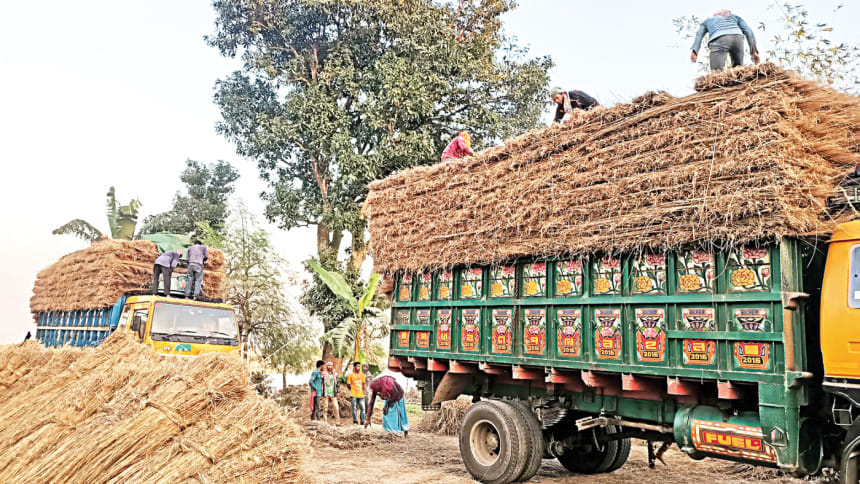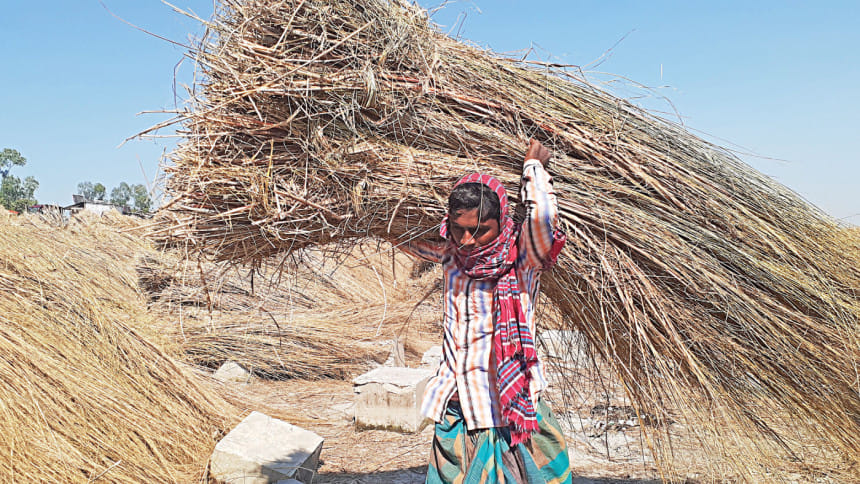Kans grass straw boosts income of char farmers

Kans grass has emerged as a significant source of income for farmers in char areas of Kurigram and Lalmonirhat, where the perennial herb native to the Indian subcontinent grows easily on sandy soil.
Naturally occurring on around 10,000 hectares of land across 150 chars on the Brahmaputra and Dharla rivers in six upazilas of the two districts, the only expense farmers need bear are those associated with transport and labour.
Each bigha of land produces some 2,000 bundles of the straw-like material, called kashful in Bangladesh, with thousands of farmers in the region now fetching up to Tk 17 per bundle weighing around two kilogrammes.
Officials of the Department of Agricultural Extension (DAE) say that kans grass has helped bring prosperity to char farmers in region as they can sell it alongside traditional crops.
Aftab Uddin, a farmer from Char Karai Barisal under Kurigram's Chilmari upazila, said he got 19,000 bundles of kashful from three acres of land this year.
"I sold it all for Tk 286,000 in a local market after having spent a total of Tk 170,000 for harvesting and transporting the plant," he added.

Uddin then said kans grass has become a source of passive income for farmers like him who are unable to cultivate most other crops on the sandy soil of char lands.
"But kashful grows here naturally and so, earnings from the plant help us run our families well," he added.
Nader Ali, another farmer from the same char, told The Daily Star he had gathered kans grass from six bighas of land last year but this year, he could only collect from four bighas due to erosion.
Wholesalers from different parts of the country, including Rajshahi, Kushtia, Barguna, Meherpur, Chuadanga and Jessore come to buy kashful from suppliers in Lalmonirhat and Kurigram.
"We are happy to be selling the plant at a fair rate this year," Ali said.
Dried kans grass is used to weave together thatch roofs and sheds that are mainly uses by farmers to protect crops that are sensitive to excessive sunlight or rain, such as betel leaf.
Jobed Ali, a farmer at Char Falimari on the Dharla river in Lalmonirhat sadar upazila, said that even though kashful production has been lower this year, they are making unexpected profits thanks to the currently higher market prices.
Similarly, Sekendar Ali Mandal, a char farmer in the Sardob area of Dharla river in Kurigram sadar upazila, said he expects good earnings from the kans grass grown on six bighas of his land, where no other crops grow.
Kashful grows naturally in the char land between April and May before being harvested in November.
"We did not get decent prices for kashful just 10 to 12 years ago but now, buyers from different areas pay well for the material," he added.
Dildar Hossain, a wholesaler from Rajshahi who came to Jorgachh Bazar in Chilmari upazila of Kurigram, said he buys kans grass from different farmers in the region before shipping it to other parts of the country by truck or boat.
"We are buying kashful from farmers at high prices and then selling it to betel growers in various districts," he added.
Hossain went on to say that kashful prices are higher this year as the demand has increased among betel leaf growers.
"The market for kans grass in the two districts is worth as much as Tk 300 crore," he said.
Nur Hossain, a wholesaler at Moghalhat area in Lalmonirhat sadar upazila, said they sometimes pay char farmers in advance for getting a supply of kashful considering the huge demand.
As such, the material is loaded onto as many as 80 trucks from the Brahmaputra and Dharla river shoal areas every day.
Also, some 35 boats are being loaded with kans grass for shipment every day, he added.
Biplob Kumar Mohanta, deputy director of the DAE in Kurigram, said local char farmers dream to earn big by selling kashful.
"The naturally growing grass is bringing solvency to many char people," he added.

 For all latest news, follow The Daily Star's Google News channel.
For all latest news, follow The Daily Star's Google News channel. 



Comments